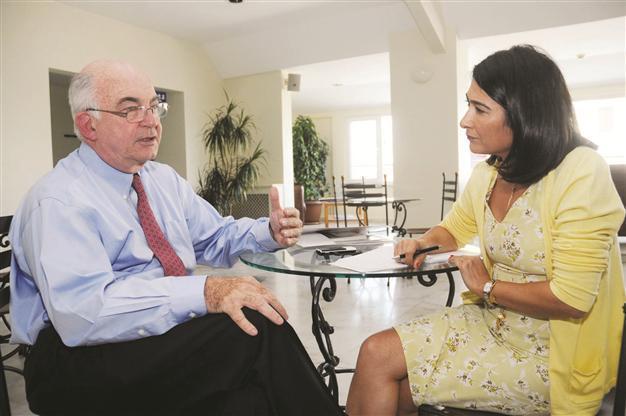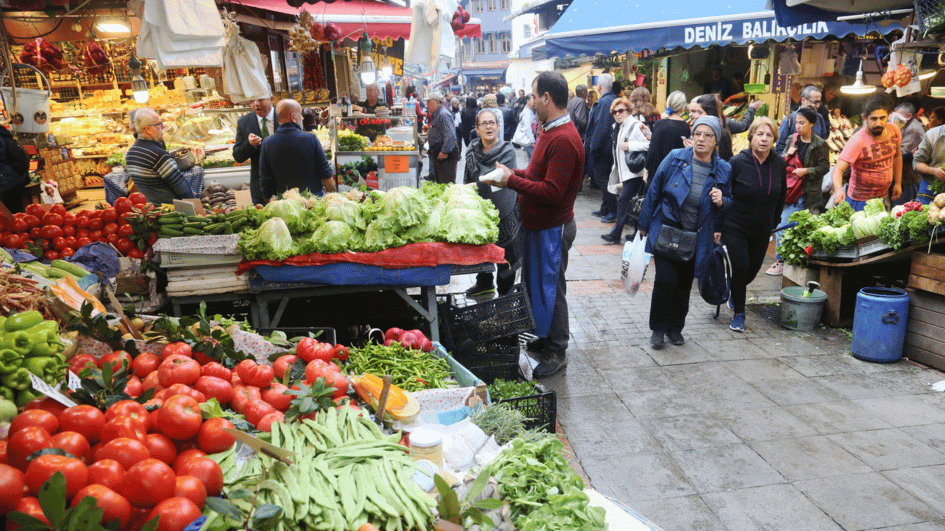Derviş: Turkey needs to focus on EU more
ISTANBUL - Hürriyet Daily News

Turmoil in the Middle East should not become Turkey’s turmoil, says world-renowned economist Kemal Derviş in an interview conducted during a short but busy visit to Turkey. DAILY NEWS photo, Hasan ALTINIŞIK
Europe is on the verge of reshaping itself, meaning that Turkey should become proactive at drafting its own proposals on what a new European Union should look like, according to Kemal Derviş, a famous Turkish economist.The new shape that the EU takes could provide new opportunities in Turkey’s relationship with Europe, said Derviş, while noting his concerns that Turkey is being pushed by some in the West to become more politically active in the Middle East. .
Turkey is receiving a lot of praise in international circles. Should we be a bit skeptical about this or sit back and enjoy it?
You should definitely enjoy it. Turkey has shown a very good performance. The growth rate has good averages. The fiscal policy has remained tough – the ratio of public sector debt to GDP is now about 38 percent, which is way below most advanced countries.
So there are many things to feel good about. But the current account deficit remains a source of vulnerability because it makes Turkey dependent on sometimes very volatile capital flows. This is an ongoing problem in Turkey which reflects insufficient national savings. Then there are sectoral problems. One area which is very important for Turkey is the energy sector. Turkey is dependent on foreign energy.
What does Turkey look like from abroad, with its internal politics as well as its foreign policy posturing?
The world sees Turkey as a strong emerging market economy. For anybody that visits Turkey, you can feel the dynamism; people are creative.Turkey is viewed as a very important regional actor. Particularly in the Middle East. These are all positive.
However, there are also weak points; one is the dependency on foreign capital. The second is a
political system which is still based on a lot of antagonism, a lot of division and a lot of harshness. There are internal issues that remain unsolved – particularly issues relating to the Kurdish language.
I am a strong believer in the republic of citizens. The individuals should, above all, be citizens of the republic. They should not have sub-identities that dominate because we see what disaster that led to in cases like Yugoslavia. At the same time, I believe each citizen should have full rights to live their lives the way they want, to speak the language they want and to feel full part of the republic. I don’t think we have succeeded in making our citizen of Kurdish origin feel fully equal in that sense. I hope we will.
A few years back, Turkey looked like a shining star, but are there now suspicions as to the limit of the role it can play?
Turkish engagement in the world has increased a lot over the last 10 years. Turkey has become an important humanitarian donor and is engaged with UN. In our region, the fact that the economy is dynamic has had an impact. Our famous TV series are also having a great impact.
Where I am a little bit more worried about is this: Just like we don’t like anybody interfering in our affairs nobody likes others interfering in their internal affairs.
We have to be very careful not to give the feeling that Turkey wants to kind of steer the internal affairs of other countries.
Actually it is not so much that the West is worried about this. I am worried more about the opposite. I am worried that some powers in the West are actually encouraging Turkey to be very proactive politically and even maybe militarily [in the Middle East].
But you also argue Turkey could help countries of the Arab Spring in their process of democratization.
Turkey should lead by example, not by interfering. This means having an economy that performs well and having a democracy in Turkey that performs well.
Inviting students from the Arab world, inviting political party representatives, opening [the country up] as much as possible to travel and trade and giving humanitarian aid.But I would rather stop there and not go beyond and take sides in disputes which are very complicated.
What will be the effect of the turmoil in the Middel east on Turkey?
It is important to keep this turmoil away from Turkey. It should not become our turmoil. And we should help as honest brokers. We should always be ready to act with the international community. Actually, I don’t think Turkey wants to act alone. I don’t see Turkish people eager to do that.
You argue that Turkey should have a role in reshaping the EU.
Europe has to reshape itself. There will be a new type of Europe with an integrated core [featuring a few countries]; then there will be other countries which will not be integrated with the core – other countries such as the United Kingdom, for example, which are still part of EU. That opens a completely new perspective for the Turkey-EU relationship. Turkey will not be part of that core. Neither Turkey nor the countries in the core would want that. But Turkey can absolutely be part of the EU. Turkey should have a say on how it should act economically and politically. We should be part of the council and the Parliament. But how should this Parliament work, given that it is composed of parliamentarians that are from countries that are part of the eurozone and part that are not. Much greater flexibility would be needed. We should now become an actor in trying to think and propose [solutions], rather than waiting for the EU to come up with proposals. We should say we think this is the way it should work.
Why should Europeans think that Turkey should play a role and become an asset for the EU?
Any European country on its own will no longer have any influence on the international scene. Acting together they will have much more weight. Turkey is an important, dynamic member of the European family; it has been a member of the family for at least 200 years.
What do you think about the discussions in Turkey about whether to slow down or boost the economy?
Turkey does have some fiscal space. It gives us the ability to try to counteract economic slowing through some fiscal widening. But one of the greatest achievements has been its fiscal policy and its commitment to reduce the public debt. I will be a bit worried about anything that endangers that.There is an argument for a little more fiscal flexibility; we should never risk losing that. Second, we still have too large a current account deficit, so if we relax fiscal policy too much, it will affect the current account deficit, and it will come back to us with greater difficulties, so it needs fine tuning.
Some argue that we can’t have an international finance center unless we have a fair justice system.
There are many things that are important for an international finance center. The financial infrastructure has developed a lot in Turkey. For all aspects, a judicial system that works well and quickly is very important. To become a center of international economic activity, it is important to be a country that is fully at peace with itself, where competition is soft, not harsh, and where people find solutions to their problems in a peaceful way.
WHO IS KEMAL DERVİŞ ?
Kemal Derviş is a member of the Executive Board of the Istanbul Policy Center and the vice president and director of the Global Economy and Development Program at the Brookings Institution. Until February 2009, he was the executive head of the United Nations Development Program In 2001-2002, as Turkish Minister of Economic Affairs and the Treasury, Derviş was responsible for launching Turkey’s successful recovery from a devastating financial crisis.
Prior to his tenure as economy minister, he had a 22-year career at the World Bank, where he served as vice president for Poverty Reduction and Economic Management in 2000.
From the end of 2002 to the summer of 2005, he severd as Istanbul deputy in the Turkish Parliament.
















